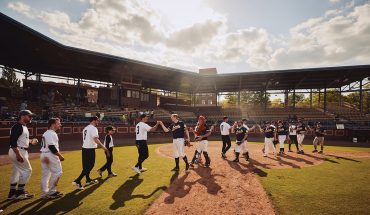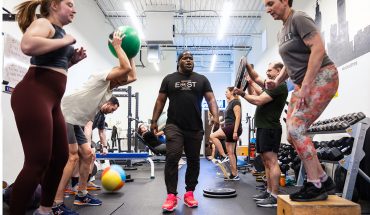
Iraqi war veteran Jim Freeze holds the Purple Heart he was awarded for service in the Iraqi war.
photographs by Robert Willett
On Nov. 11, our nation honors the service of all military veterans. North Carolina has the third-largest military population in the country, and is also home to nearly 800,000 veterans, so our state has a special role in recognizing those who have served our country.
Raleigh in particular is home to many of these brave men and women. Walter is proud to honor the service of all our local veterans with these stories of a few.

WWII veteran Richard Peyton Woodson III received France’s National Order of the Legion of Honor.
Richard Peyton Woodson III
Army Air Force; WWII 1944 – 1946
Richard Peyton Woodson III, a pilot in the U.S. Army Air Force during World War II, dropped life-saving food packages to starving civilians in German-occupied Holland and rescued French prisoners from a Nazi concentration camp, among other heroic wartime acts. But this recipient of France’s National Order of the Legion of Honor describes his service as “a very ordinary story.”
“There were millions of servicemen in World War II who were doing extraordinary things,” Woodson says. The longtime Raleighite is no stranger to extraordinary things, in war or in peacetime. The former chairman of the British American Insurance Company was inducted into the Raleigh Hall of Fame in 2013 in recognition for his business and philanthropic contributions here. He “has generously devoted his time and resources to advance education and the arts throughout the Triangle and beyond,” the group said. “His contributions have made Raleigh the dynamic place that it is today.”
Woodson, now in his 90s, set out to make a difference early. As an undergraduate at Princeton, he was an eager soldier, enrolling in the university’s ROTC program in order to join its esteemed field artillery unit. When Pearl Harbor was attacked, Woodson, then 19, volunteered for the Army Air Corps “the very next day.” He finished college as a reservist, and proceeded to basic training in February 1943. Pilot training in Texas followed. Soon he was flying PT-19s, then the BT-1s, UC-78, and finally, in Florida, the heavy bomber B-17s he would fly in Europe.
That post began in September 1944, when Woodson was sent to Snetterton Heath in Norfolk, England, where he flew with the 96th bomb group of what he calls “the mighty Eighth Air Force.” Woodson regularly woke in the dark of night to fly alongside fellow B-17s through thick cloud cover to assemble in combat formation before heading to Germany.
As the war ended, the bomb group took on a brave humanitarian mission. On May 1, 1945, Woodson and his crew were among the first to drop food into the still-occupied western Netherlands, where civilians were starving. The crew had to fly at an extremely low altitude – below 1,000 feet – to drop the food, praying that German anti-aircraft artillery wouldn’t try to take them down in the process. The desperate need of the Dutch people steeled the crew’s resolve. “We could see their faces,” Woodson recalls. “People were standing on rooftops. They were leaning out of windows. They hung sheets out the windows of their apartment buildings, spelling out ‘Thanks, Yanks.’” Operation Chowhound, as the effort was dubbed, continued for five days. Some planes were hit in the process. Woodson’s was not.
More than a decade later, at a party in Raleigh in 1956, Woodson met Aat Zevenhuizen who had been a 7-year-old hiding in the bushes to be “the first to get the food” during that drop. His family was starving, surviving only on tulip bulbs, and the food saved their lives. Eleven years later, when the two men realized how their fates had intertwined, the Dutch man enveloped Woodson in a massive hug. “That was pretty emotional, I must admit,” Woodson says today. “I had not given much thought to that food drop” before that chance meeting, he says. “It was just another mission. But to hear that, it has been extraordinary for me.” It wasn’t long after that he met John Pace, whose aunt had also been saved by Woodson’s mission. Then an 8-year-old girl, Pace’s aunt watched as the B-17s dropped food in her town of Ypenburg, where Woodson had flown. The food saved her life and the life of her mother.
That same first week in May, Woodson and his crew saved still more lives. At the Mauthausen concentration camp in Austria, thousands of prisoners were stranded without food and left to starve when SS officers in charge abandoned the camp. Among them were 3,000 French prisoners, whom Woodson and his fellow bombers rescued, 30 at a time, and flew to Chartres, France. In honoring that rescue last June, Denis Barbet, the Consul General of France in Atlanta, presented Woodson with the National Order of the Legion of Honor, which was established by Napoleon Bonaparte in 1802 to recognize outstanding service to the French Republic, and is considered France’s highest honor for military and civil merits. “It is thanks to them, who fought against tyranny and for a free world, that we were able to celebrate the peace restored to a democratic Europe,” Barbet said. “Dear veterans, you are our heroes. By fulfilling your duty to your country, you helped ensure liberty and democracy for the French people, and we will never forget that.” –Liza Roberts

WWII veteran John Irby received the Silver Star for gallantry in combat.
John Irby
Army; WWII 1943 – 1946; Korean War 1950 – 1952
Ask 93-year-old Raleighite John Irby what he remembers most about his time in World War II, where he served in General George Patton’s Third Army, and he will likely talk about the Battle of the Bulge.
The Battle, one of the last major German offensive actions in the war and the cause of massive casualties, was Irby’s first combat experience. When he arrived in Bastogne, Belgium, his first assignment was to collect corpses – civilians, Germans, Allies, everyone.
“I had to go through four city blocks and pick up all the dead people. There were about 12,” Irby says. “What I remember more than anything was it was extremely cold and all the corpses were frozen. It was good I guess, because they were like blocks of ice.”
“That was my introduction into combat,” he remembers. “That was pretty severe for me to be faced with that in the first few hours.”
Irby didn’t come from a military family. His father, a dentist, served in World War I, but never went overseas. Irby says his father always regretted that he didn’t get to go. For his part, Irby was drafted into the war during his third year of college at Virginia Military Institute.
“We didn’t expect that. We thought we would graduate,” he says. “They pulled us out a year ahead of time.” Irby was quickly assigned as the leader of an Army reconnaissance platoon of 33 men. That was his job from then on, he said. And though combat was challenging, the fight to stay warm was tougher, Irby remembers.
“There is no question in my mind that 1944 to 1945 was the coldest winter in Europe in 40 years. We just tried to keep from freezing and find shelter in a building. We often slept on the ground in 1- to 10-degree temperatures. That was more difficult than the combat, just trying to survive the cold winter,” Irby says.
He is most proud of the Silver Star he received for gallantry in combat for his actions when he found himself and his platoon in a tight spot, outnumbered and surrounded by Germans.
They were traveling with an armored division into enemy territory. When a division is on the move, it is typically broken up into three combat commands of 4,500 troops, Irby explains. The first advances into enemy territory; and it is standard procedure, he says, for a reconnaissance platoon to stay the point and find out where enemy forces are. Irby’s platoon often did just that. On one occasion, Irby got ahead of his combat command, and his platoon was separated by about a quarter-mile. That was just enough for German forces to close in on his platoon.
“There were about 60 men or so, but we had superior fire power,” Irby said. “All our armored vehicles and jeeps had machine guns. We captured the whole force. There were about 60 of them and 33 of us.”
After the war, Irby went back to college to finish his degree in civil engineering. He was in the Army reserves when the Korean War started, and he served 17 months stationed at various Army bases in the United States. Irby spent his career in design and construction, working in northern Virginia. His job moved him to Raleigh in 1960, and he has been here ever since. –Taylor Knopf

WWII veteran John Penix served in Guam as a member of the Army.
John Penix
Army Air Force; WWII 1942 – 1946
Just a few days before Christmas 1942, John Penix was drafted into the Army Air Force to serve in World War II. The Wake County native reported to Fort Bragg and was sent to Utah for three months of basic training.
“Everyone was being drafted. I wasn’t surprised,” Penix says. “I figured it would happen sooner or later.” After basic training, Penix was sent to advanced training for Army administration. By the time he got to Florida where an outfit was packing up to go overseas, he was told he wasn’t trained to go overseas with them.
“That’s the best deal I ever got in the Army,” Penix says, grinning. “I stayed there until the war was over.” Penix says he had a relatively easy life in being in Army administration, which he was grateful for. “I had a typewriter instead of a rifle,” he says. “I never had a rifle except at the shooting range.”
He sat behind a desk until he got to Guam, where he was put in charge of a squadron.
That happened after the war ended in 1945, when Penix was sent to Greensboro, N.C., and was placed on a shipment to Guam. There, he was on a service unit responsible for maintaining the base, runways, and airplanes. As First Sergeant, Penix oversaw the troops in his unit and made sure they were doing what they were supposed to.
“Only black troops did the hard, dirty work,” Penix says. “Any official order that came down would have an asterisk before your name. That way there was no mistake about who you were. That meant you were part of the ‘colored troops.’”
He said the terms “black” and “African American” weren’t used until the 1960s. Penix doesn’t seem to hold a grudge over it. He simply says that is the way things were.
“Everything was different then with segregation,” says Penix, now 94 years old, as he sits in his living room wearing a “proud to be an American” T-shirt.
After the military, Penix finished school and found a career in the postal service. He raised his two children on his own in Dayton, Ohio. He says he only meant to drive through Ohio, but felt very welcomed by the community who ultimately helped him raise his children. He retired as postmaster of Yellow Springs, Ohio. In the 1980s, Penix moved back to Raleigh to be closer to family and friends. –Taylor Knopf

Courage: Iraqi war veterans Jim and Grace Freeze photographed at Caroll’s Kitchen, a nonprofit restaurant that Jim has opened in downtown Raleigh.
Jim and Grace Freeze
West Point 2001 – 2005; Army 2005 – 2011
Jim and Grace Freeze, both 33, were newlyweds when they were deployed to Iraq nine years ago and had to spend 16 months apart. It was a scenario they could not have predicted five years earlier as freshmen meeting through friends and Bible study, and just starting college life at West Point.
The United States Military Academy had appealed to both of them because of its stellar reputation, free tuition, and guaranteed job after graduation. “Also I think I wanted to serve my country just to give back,” Jim says. “I feel like I was the recipient of a lot of good that America offers.”
But a month after they started at West Point, the unthinkable happened. The World Trade Center was attacked and the United States was going to war. The message to all West Point students was clear, Jim says: “When you graduate, you are going to war … now let’s get you trained up.”
Both started as lieutenants, the lowest rank for an officer. Grace served as a military police officer and Jim as an armor officer. During their first deployment, they were sent to different areas of Iraq and their paths never crossed, though they corresponded once a week through email or phone.
Their experiences in Iraq were very different.
For her part, Grace trained Iraqi police, traveling in an armored vehicle between police stations to assess progress and make sure everyone had the proper resources. “We would teach them how to set up a holding cell, how to do a witness statement, conduct basic investigations,” Grace said. “The culture is different there. They don’t have the same technology or literacy.”
Grace said she is often asked if the Iraqi officers had trouble respecting her as a women in leadership. “In my experience, they alway treated me probably even better. They understood that in American culture and our military, men and women could be in leadership,” she said. “So they were very accommodating, even though that was very different for the Iraqi men.”
During Jim’s first deployment, he was responsible for securing towns and villages. He also communicated with local officials to find out what they needed most. Ultimately, they wanted jobs, Jim says. “They wanted the young people to get back to work so they wouldn’t engage in violence. The war threw their economy into chaos … They would say, ‘Help us get jobs again and that will help with our security.’” Jim focused on “what we could do to improve the economy in these local villages, and it seemed to work. Violence went down considerably by the time we left.”
He and his men also faced “harrowing situations.” In one instance, he was wounded and sent to a Baghdad hospital with second degree burns on his face. A few of his soldiers were injured and sent back to the U.S., and one was killed.
Between deployments, for about 18 months, both Jim and Grace were stationed at different military bases. The second time, in 2010, the couple went back to Iraq together. That time, their experiences were completely different.
The war in Iraq was “ramping down,” Grace recalls.
“It was tremendously eye-opening for me to see the war from the ground level in 2007 – 2008 with a lot of violence,” Jim said. “Then to see it in 2010 on a broader scale, a lot had changed. There was tremendous progress and it looked worlds different.”
As part of the military police, Grace assessed the capability and readiness of the Iraqi security forces as a whole to determine if the U.S. could leave. Jim, meantime, spent his second deployment as the right-hand man to a one-star general who spent a year meeting with governors and businessmen in the southern part of Iraq. Jim estimates he spent as many as 450 hours in a helicopter traveling 62,000 miles with the general over that year.

Iraqi war veteran Grace Freeze holds the Bronze Star she was awarded for service in the Iraqi War.
“I saw a lot of potential that things could have changed for good,” he says. “But I also saw the potential that this could easily get thrown off kilter. Potential doesn’t guarantee success.”
After six years actively serving in the Army, the Freezes moved on and started a family. They now have two boys, ages 2 and 4. Jim moved to Raleigh for a job with a recruiting firm that helps veterans find jobs, while Grace got her master’s degree from N.C. State.
In September, Jim opened Carroll’s Kitchen, a nonprofit restaurant on Martin Street in downtown Raleigh that provides jobs for women from local homeless shelters. –Taylor Knopf



